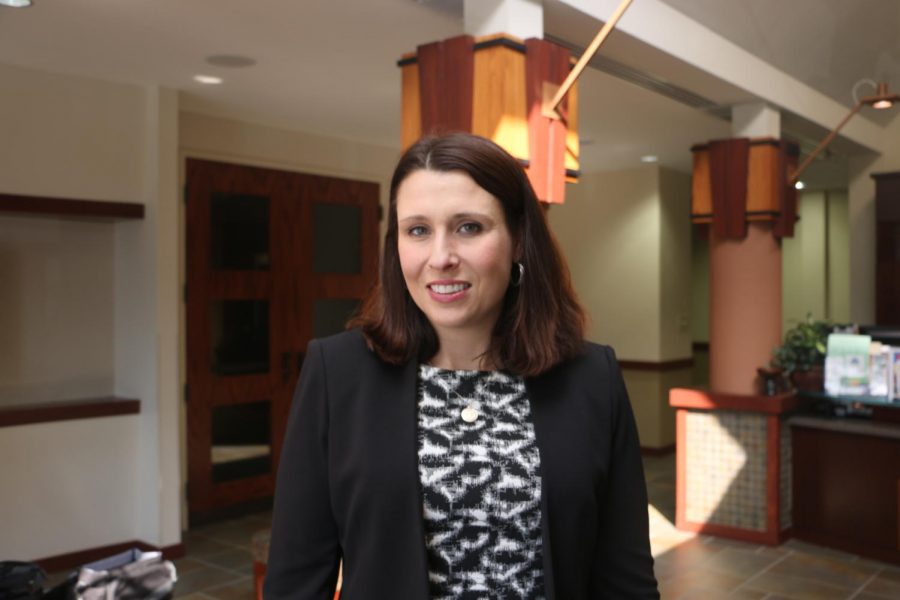What’s your full name and title?
Stephanie Whiteside, Mental Health Coordinator
When did you start working for the CCS district?
Beginning of June, 2019.
What exactly is the role of the mental health coordinator?
One thing is supporting and providing critical advice, specifically to social workers and counselors regarding mental health. So things like helping them identify sources, being there to talk about certain situations going on that have a mental health component, and aiding in professional development and answering any questions about mental health.
So will you actually partake in counseling or are you primarily just overseeing everything?
I am more of a consultant, so I won’t be giving advice and therapy, but will be there for support and to answer any questions the counselors may have.
Do you have any plans for this year, specifically in addressing the issue of CCS mental health?
Right now, it’s mainly a groundbreaking year. The biggest thing I want to do is spread awareness, not only about what I do, but also about mental health in general. Our high school does a great job with Culture of Care, and so what I’d like to do is be able to allocate it to our whole district, so that we are promoting mental health in every school. A couple other things that I will be working on is called Social Emotional learning, so much like how you learn about math or science or english, we also want to teach students how to identify their feelings, because that will help us better understand what we can do and how we can deal with it.
What’s your take on mental health’s stigma in schools and do you have any plans to stop it?
I feel like in the last five years, we have made good changes when it comes to stigma. I feel like our district has already done a lot when it comes to stigma. But, I definitely feel like there are more things we can do. So, one of my goals is to really communicate with both parents and students about how relevant stigma is and strategies to combat it. My hope is that we can eventually talk about mental health like any other health concern. For example, it’s normal to say, ‘oh, I broke my leg the other day,’ and my hope is for people to do the same with depression and anxiety. I want them to feel empowered to talk about it, and not only talk about the challenges, but also about the good things to create a more safe environment and outlook on it.
What are some words of advice for students on how they can help remove the stigma/help out in general?
Words matter. Calling kids like psycho can be really toxic, especially when we see things regarding active shooters and many automatically go to things like mental health. That can be really discouraging people to those who have depression or anxiety, because there are many people we interact with everyday who have been diagnosed or exhibit symptoms, and don’t have a violent bone in their body. So, just being aware that life can be tough and remembering to treat everyone with kindness can go a long way, and will definitely help out regarding the toxic stigma regarding mental health.
Is there anything you’d like to say that you’d like the public to know?
I want to remind families and students to know that I’m a resource to the school, so I’ll always be here for them.

































![AI in films like "The Brutalist" is convenient, but shouldn’t take priority [opinion]](https://hilite.org/wp-content/uploads/2025/02/catherine-cover-1200x471.jpg)









































![Review: “The Immortal Soul Salvage Yard:” A criminally underrated poetry collection [MUSE]](https://hilite.org/wp-content/uploads/2025/03/71cju6TvqmL._AC_UF10001000_QL80_.jpg)
![Review: "Dog Man" is Unapologetically Chaotic [MUSE]](https://hilite.org/wp-content/uploads/2025/03/dogman-1200x700.jpg)
![Review: "Ne Zha 2": The WeChat family reunion I didn’t know I needed [MUSE]](https://hilite.org/wp-content/uploads/2025/03/unnamed-4.png)
![Review in Print: Maripaz Villar brings a delightfully unique style to the world of WEBTOON [MUSE]](https://hilite.org/wp-content/uploads/2023/12/maripazcover-1200x960.jpg)
![Review: “The Sword of Kaigen” is a masterpiece [MUSE]](https://hilite.org/wp-content/uploads/2023/11/Screenshot-2023-11-26-201051.png)
![Review: Gateron Oil Kings, great linear switches, okay price [MUSE]](https://hilite.org/wp-content/uploads/2023/11/Screenshot-2023-11-26-200553.png)
![Review: “A Haunting in Venice” is a significant improvement from other Agatha Christie adaptations [MUSE]](https://hilite.org/wp-content/uploads/2023/11/e7ee2938a6d422669771bce6d8088521.jpg)
![Review: A Thanksgiving story from elementary school, still just as interesting [MUSE]](https://hilite.org/wp-content/uploads/2023/11/Screenshot-2023-11-26-195514-987x1200.png)
![Review: "When I Fly Towards You", cute, uplifting youth drama [MUSE]](https://hilite.org/wp-content/uploads/2023/09/When-I-Fly-Towards-You-Chinese-drama.png)
![Postcards from Muse: Hawaii Travel Diary [MUSE]](https://hilite.org/wp-content/uploads/2023/09/My-project-1-1200x1200.jpg)
![Review: "Ladybug & Cat Noir: The Movie," departure from original show [MUSE]](https://hilite.org/wp-content/uploads/2023/09/Ladybug__Cat_Noir_-_The_Movie_poster.jpg)
![Review in Print: "Hidden Love" is the cute, uplifting drama everyone needs [MUSE]](https://hilite.org/wp-content/uploads/2023/09/hiddenlovecover-e1693597208225-1030x1200.png)
![Review in Print: "Heartstopper" is the heartwarming queer romance we all need [MUSE]](https://hilite.org/wp-content/uploads/2023/08/museheartstoppercover-1200x654.png)




